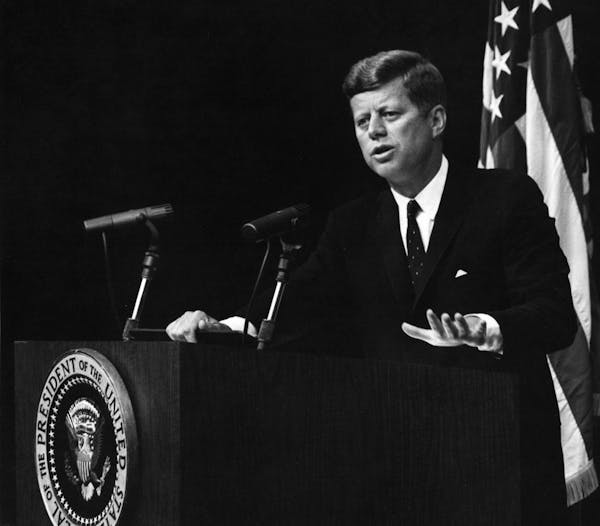Students in Meg Peterson's world literature class at St. Paul Central High School can recite passages by Chinese writer Lu Xun and rattle off events in the American Revolution. But when it comes to questions about one of the most devastating days of the 20th century, the response is a sea of shrugs.
Not a single one of the 30 juniors knew that Nov. 22 will mark the 50th anniversary of President John Kennedy's assassination and only five could cite Dallas as the location. Reactions were similar next door, though about half of the 30 teenagers in an advanced-placement class had seen footage from those tragic days.
"It's interesting stuff," said 16-year-old Lucia Toninato. "But it's not really relevant."
That may be news to mainstream media. Publishers are issuing about 20 new books on the assassination this year and TV will dedicate more than 100 hours of programming to the anniversary this month. But to younger Americans, they might as well be telling stories from the Stone Age.
"I don't know if 'forgotten' is the right word, but that visceral ownership of that moment has not been passed on to newer generations," said actor Rob Lowe, who plays JFK in National Geographic Channel's "Killing Kennedy," airing Nov. 10.
Lowe speaks from experience as the father of a college freshman. "We're trying to introduce details to people who might not know what it meant for this country to lose him."
Joyce Ladner, a civil rights activist who helped organize the 1963 March on Washington, is worried that young people, particularly blacks, are not getting a proper education about Kennedy and the role he played in the civil rights movement.
"It's a very sad situation because they're not learning the history that could inspire them and their generation," she said.
O.J. trumps JFK
JFK was the first made-for-TV president — a telegenic political force whose death and funeral became a four-day television event viewed by 93 percent of Americans.
A generation ago, it was routinely regarded as the most important moment in TV history. But in a survey on that topic last year by Sony Electronics and Nielsen, it ranked only 15th, behind 9/11, Hurricane Katrina, the Challenger space shuttle accident and even the O.J. Simpson car chase.
Veteran journalist Roger Mudd, who covered Kennedy for CBS, thinks one problem is that there are so many media sources that Americans no longer get a concise, responsible account of current — or past — events.
"We have a whole nation sort of left on its own," Mudd said. "With no stimulation to find out what happened yesterday or any interest in it, all those marvelous stories from before just float away."
But that hasn't kept people from commemorating such historical milestones as Abraham Lincoln's birthday, Independence Day and Martin Luther King's "I Have a Dream" speech. Lary May, professor emeritus of American studies and history at the University of Minnesota, said it's no coincidence that Kennedy's death isn't similarly memorialized.
"I think the assassination was when our country started to lose faith in the government," he said. "The uncomfortable connection would explain the amnesia."
Challenge for teachers
Some argue that discomfort is exactly why schools need to put more emphasis on JFK and the other events of 1963, when tensions between the Soviet Union and the United States were high.
"Anyone born after 1982 hasn't a clue how psychological the Cold War was," said historian Tim Naftali, co-author of "One Hell of a Gamble: Khrushchev, Castro and Kennedy" and former director of the Richard Nixon Presidential Library. "You cannot understand Kennedy if you do not understand nuclear terror and the fear of nuclear war. That's what you have to convey to kids, and that's tough because it's not intrinsic to them. In fact, their parents probably don't even get it. But good teachers do."
Teaching nuance and mood is unusual at high school, according to Katherine Hayes, an assistant professor of anthropology at the University of Minnesota who specializes in historical memory.
"When history gets taught in school, the focus is on objective things. Significance and rationale are not part of the curriculum," Hayes said. "That's too bad, because kids don't quite get it right."
History can inform our understanding of current problems, she said, pointing to immigration policy as an example.
"We often appear to be repeating our mistakes because we don't remember what happened in the past, like Japanese internment in World War II and profiling of Muslims today," Hayes said. "As for JFK, if we seriously grapple with that history and what might have happened if he wasn't shot, we might have better insight to the state of politics today. We desperately need younger folks to take a serious interest in politics and not let themselves be convinced by simple characterizations."
Micah Varnado, a 16-year-old St. Paul Central student, appears eager to learn more about Kennedy. If only she had the time.
"Knowing a lot of these things about American history would be great, but we're taught what's going to be on the test. That's what gets you an A," she said. "The assassination is not going to be on the test."
Mark Samels, executive producer for PBS' "American Experience," hopes his four-hour documentary "JFK," which premieres Nov. 11-12, will help turn the tide.
"I don't pile on my kids about knowing everything about my childhood, but I think there's a natural time in our lives when we turn around and go, 'What are those lessons? What really was that? I've heard of it, but I don't really know it,' " he said.
"Our staff is made up of a lot of twenty-somethings. They can't wait to watch the show and find out what's behind this John F. Kennedy they've heard about."
612-673-7431 • Twitter: @NealJustin

Minnesota Sports Hall of Fame: A class-by-class list of all members

This retired journalist changed professional wrestling from Mankato

